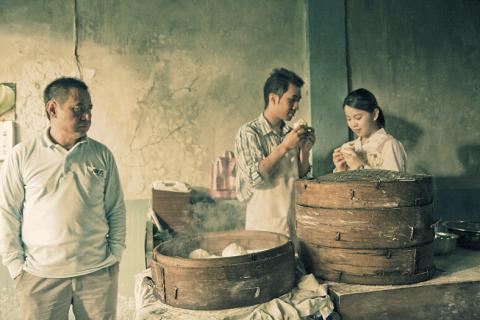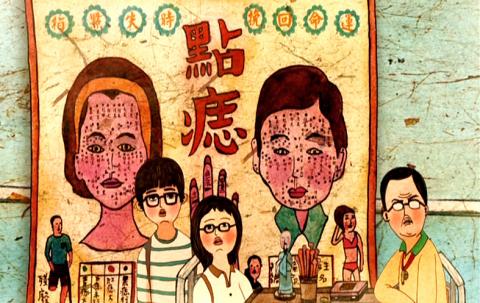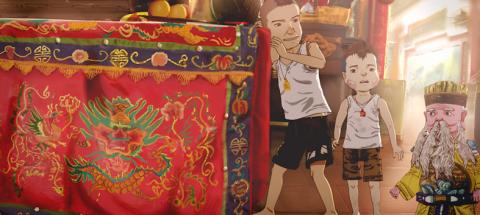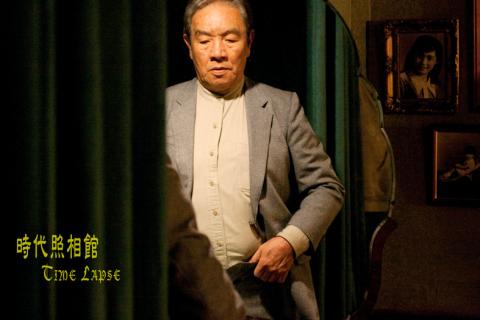Taiwanese cinema is experiencing a revival. University film courses are expanding and becoming more popular and young filmmakers are making their presence felt. In another sign of an emerging cinematic renaissance, entries to the Golden Harvest Awards (金穗獎) have risen from 115 in 2008 to 215 this year.
“The Golden Harvest has grown from a small event to an arena of competition between filmmakers,” said film critic Tien Kuo-ping (田國平), who is also known as Pin Chiung Nan (貧窮男).
Fifty selected films will compete in five categories (fiction, animation, documentary, experimental and student films) for a total of NT$3 million in prize money at this year’s Golden Harvest Awards.

Photo Courtesy of Chinese Taipei Film Archive
The awards ceremony will take place at the Plum Wine Factory (烏梅酒廠), Huashan 1914 Creative Park (華山1914), on March 25.
As well as more entrees than previous editions, the quality of the films has risen, said Tien. Animation in particular continues to grow more mature and polished in terms of technique and styles, eclipsing contenders in the feature, documentary and experimental sections, said Tien, though he added that the role of storytelling often takes a back seat.
Covering a gamut of topics from history and Aboriginal culture to the environment and biography, the documentary category nominees are diverse in subject matter but offer few surprises and lack developed viewpoints, according to Tien.

Photo Courtesy of Chinese Taipei Film Archive
Experimental cinema, as usual, occupies an obscure corner of the annual competition, whose jury members are mostly film professionals and scholars who may not be familiar with experimental filmmaking techniques.
The festival runs until March 27, after which it will tour the rest of the country until May 13. For more information, visit the event’s Web site at www.movieseeds.com.tw or its blog at gha33.pixnet.net/blog.
Awards highlights

Photo Courtesy of Chinese Taipei Film Archive
Crossing the sentiMENtal Desert (焉知水粉)
Who says a student film can’t boast a top-notch cast? This graduation project, by Chang Teng-yuan (張騰元) from Shih Hsin University (世新大學), stars celebrated thespian Tsai Chen-nan (蔡振南) and polished film and theater actor Huang Jian-wei (黃健瑋) as a father (Tsai) and son (Huang) who become estranged after a young Vietnamese woman is hired to help out at the parent’s steamed bun shop.

Photo Courtesy of Chinese Taipei Film Archive
Magabahai (馬嘎巴海)
Music and the sounds of Nature are the biggest draws of this feel-good movie about friendship between an Amis tribe elder and an American cyclist. The fact that director Patrick Tu (杜均堂) is the son of renowned recording artist Tu Duu-chih (杜篤之) explains why the sound track is of such high quality. The film won the Best Short Film Golden Horse Award last year, which should be an inspiration to budding filmmakers.
The Other Side

Photo Courtesy of Chinese Taipei Film Archive
In this whimsically dark animation, female director Chen Chiu-ling (陳秋苓) paints a brooding portrait of one woman’s experience of growing up, breaking free from her domineering mother and escaping to the “other side” of the ghostly town in which she lives.
Time of Cherry Blossoms (櫻時)
Taiwan’s folk beliefs come to life in this well-crafted animation, which tells the tale of a boy who is accompanied on an adventure by celestial beings. The film shows a surprisingly mature style reminiscent of late Japanese animator Satoshi Kon’s works and is regarded as one of the strongest contenders in the Golden Harvest Awards’ best animation category.
Time Lapse (時代照相館)
This 30-minute film touches on the themes of life, death and memory through a bittersweet tale about an aging photographer, played by veteran actor Ting Chiang (丁強), and four teenage boys. Blessed with a polished script, smooth cinematography and emotive performances, Time Lapse has got off to a good start at this year’s Golden Harvest by winning a recommendation award, which is judged by bloggers and was introduced to the festival in 2007.

Google unveiled an artificial intelligence tool Wednesday that its scientists said would help unravel the mysteries of the human genome — and could one day lead to new treatments for diseases. The deep learning model AlphaGenome was hailed by outside researchers as a “breakthrough” that would let scientists study and even simulate the roots of difficult-to-treat genetic diseases. While the first complete map of the human genome in 2003 “gave us the book of life, reading it remained a challenge,” Pushmeet Kohli, vice president of research at Google DeepMind, told journalists. “We have the text,” he said, which is a sequence of

On a harsh winter afternoon last month, 2,000 protesters marched and chanted slogans such as “CCP out” and “Korea for Koreans” in Seoul’s popular Gangnam District. Participants — mostly students — wore caps printed with the Chinese characters for “exterminate communism” (滅共) and held banners reading “Heaven will destroy the Chinese Communist Party” (天滅中共). During the march, Park Jun-young, the leader of the protest organizer “Free University,” a conservative youth movement, who was on a hunger strike, collapsed after delivering a speech in sub-zero temperatures and was later hospitalized. Several protesters shaved their heads at the end of the demonstration. A

Every now and then, even hardcore hikers like to sleep in, leave the heavy gear at home and just enjoy a relaxed half-day stroll in the mountains: no cold, no steep uphills, no pressure to walk a certain distance in a day. In the winter, the mild climate and lower elevations of the forests in Taiwan’s far south offer a number of easy escapes like this. A prime example is the river above Mudan Reservoir (牡丹水庫): with shallow water, gentle current, abundant wildlife and a complete lack of tourists, this walk is accessible to nearly everyone but still feels quite remote.

In August of 1949 American journalist Darrell Berrigan toured occupied Formosa and on Aug. 13 published “Should We Grab Formosa?” in the Saturday Evening Post. Berrigan, cataloguing the numerous horrors of corruption and looting the occupying Republic of China (ROC) was inflicting on the locals, advocated outright annexation of Taiwan by the US. He contended the islanders would welcome that. Berrigan also observed that the islanders were planning another revolt, and wrote of their “island nationalism.” The US position on Taiwan was well known there, and islanders, he said, had told him of US official statements that Taiwan had not